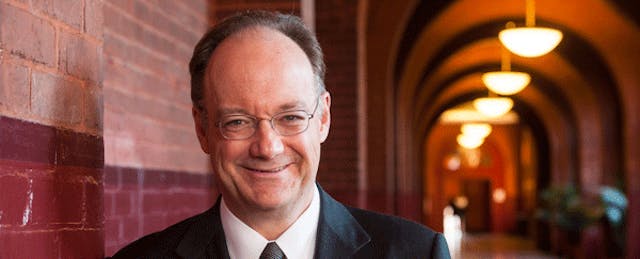Here’s what John DeGioia, president of Georgetown University, had to say.
Little pigs, french hens, a family of bears. Blind mice, musketeers, the Fates. Parts of an atom, laws of thought, a guideline for composition. Omne trium perfectum? Create your own group of threes, and describe why and how they fit together.
We live in a moment of extraordinary disruption and challenges to higher education. We are engaging with questions such as, How do we expand access to postsecondary education? How do we ensure affordability for our students and their families? What roles can and should new learning technologies play? What will it mean to be a global university?
With challenge, each of these questions presents opportunities for innovation and transformation--opportunities to reimagine what the university of the future can and should be.
Last fall at Georgetown University, we launched a new project to help engage these opportunities; to explore new ideas, new technologies, and new models of learning; and to actively experiment with new ways to deliver the education we value into the future. We call this effort “Designing the Future(s) of the University.”
Our efforts are guided by two defining questions: which new innovations and models do we embrace? And which parts of our core mission--of the very idea of “the university”--do we protect?
At its launch, I offered reflections on the three interlocking and mutually reinforcing roles of the university that we must protect as we envision the future. These three roles define the very mission and heart of our universities; in tandem, they comprise what a university is and cannot be split up.
First, Formation: A university must provide the context for young people to engage in the work of personal formation, to come to terms with the question, “What constitutes an authentic life?”
A university does this by introducing students to approaches to knowing--to the methodologies of knowing, to different perspectives, different bodies of knowledge. It teaches students how to integrate, appropriate, challenge and critique knowledge--how to see patterns, make connections, identify anomalies. And, beyond this, it introduces students to a way of being, a way of proceeding in this world, a way of life that accompanies the knowledge that they gain. In doing so, it helps them to know themselves, to identify the conditions that will provide for an authentic, flourishing life.
Second, Inquiry: A university must be a place that sustains faculty in its scholarly endeavors, a place that ensures that the defining dynamic of scholarship, what Stefan Collini calls the “ungovernable play of the enquiring mind,” can be given limitless room for exploration.
A university does this by recognizing that scholarly work is characterized by uncertainty, that it involves many retracings and repeated experiments, and makes great demands on those engaged in it. In recognizing this, it refuses to put time limits on the pursuit of knowledge and instead provides security--a sense of confidence--that the scholarly work of faculty members can be sustained over a long period of time.
Third, the Common Good: A university must contribute to the common good: enriching the public discourse, sharing what it has discovered, and responding to the needs of the world around it.
A university does this through formation and through inquiry by providing expertise to the community via faculty members, by preparing young people for lives of meaning and service, and by being a place for continuing education for everyone, not just for young people. It chooses to see itself not as an institution designed to dump “skills” in students’ laps and laptops, but as a place that works to serve the public good.
As we engage this new landscape in higher education and explore the extraordinary array of innovation and new ideas before us, we must seek to remain true to these three roles: formation, inquiry, and the common good. By starting with this group of three, we can engage the vast array of opportunities before us with the integrity, humanity, and courage this moment demands.


